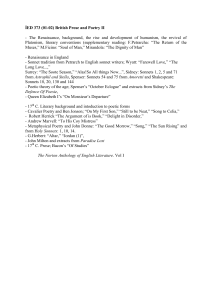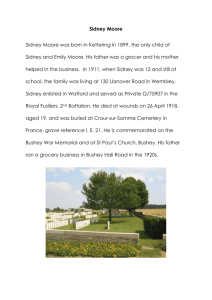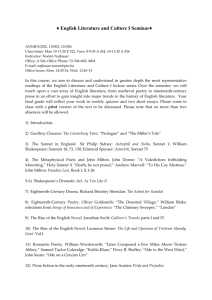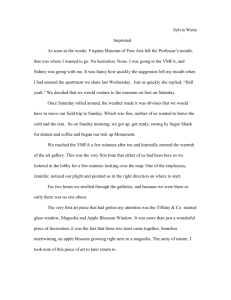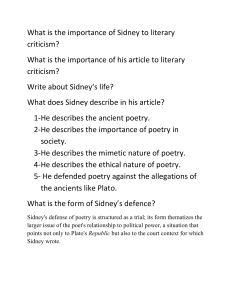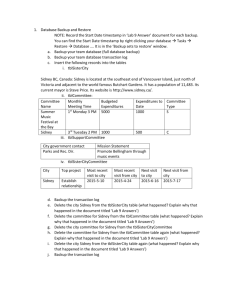Sidney and Astrophil - The Johns Hopkins University Press
advertisement
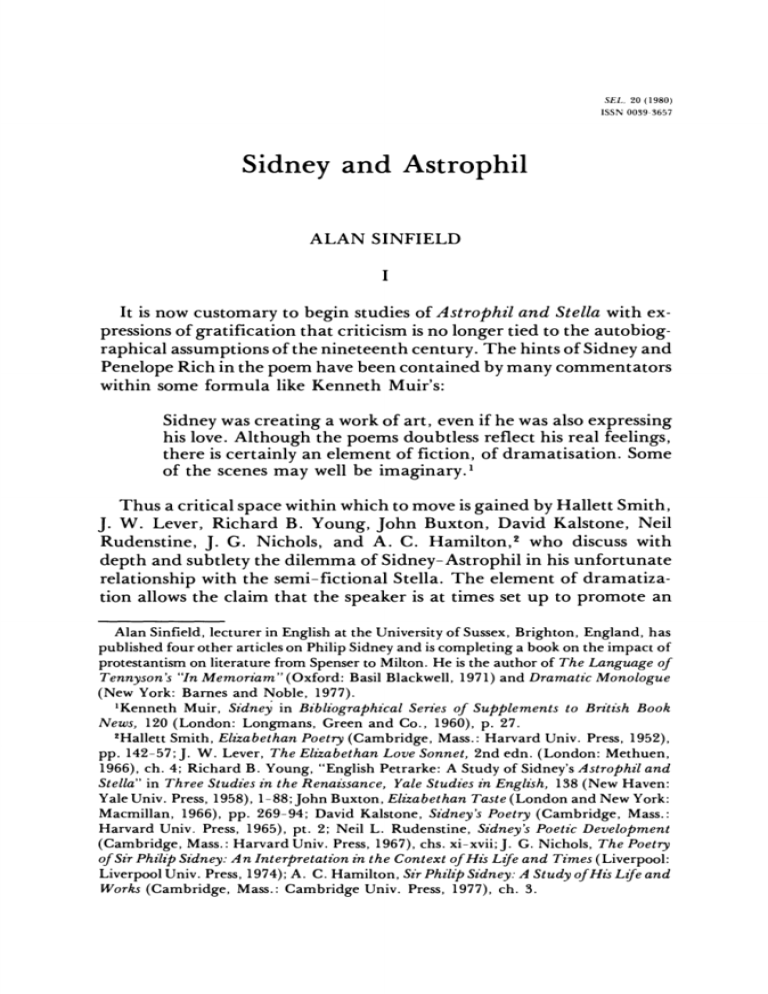
SEL, 20 (1980) ISSN 0039-3657 Sidney and Astrophil ALAN SINFIELD I It is now customary to begin studies of Astrophil and Stella with expressions of gratification that criticism is no longer tied to the autobiographical assumptions of the nineteenth century. The hints of Sidney and Penelope Rich in the poem have been contained by many commentators within some formula like Kenneth Muir's: Sidney was creating a work of art, even if he was also expressing his love. Although the poems doubtless reflect his real feelings, there is certainly an element of fiction, of dramatisation. Some of the scenes may well be imaginary.' Thus a critical space within which to move is gained by Hallett Smith, J. W. Lever, Richard B. Young, John Buxton, David Kalstone, Neil Rudenstine, J. G. Nichols, and A. C. Hamilton,2 who discuss with depth and subtlety the dilemma of Sidney-Astrophil in his unfortunate relationship with the semi-fictional Stella. The element of dramatization allows the claim that the speaker is at times set up to promote an Alan Sinfield, lecturer in English at the University of Sussex, Brighton, England, has published four other articles on Philip Sidney and is completing a book on the impact of protestantism on literature from Spenser to Milton. He is the author of The Language of Tennyson's "In Memoriam" (Oxford: Basil Blackwell, 1971) and Dramatic Monologue (New York: Barnes and Noble, 1977). 'Kenneth Muir, Sidney in Bibliographical Series of Supplements to British Book News, 120 (London: Longmans, Green and Co., 1960), p. 27. 'Hallett Smith, Elizabethan Poetry (Cambridge, Mass.: Harvard Univ. Press, 1952), pp. 142-57; J. W. Lever, The Elizabethan Love Sonnet, 2nd edn. (London: Methuen, 1966), ch. 4; Richard B. Young, "English Petrarke: A Study of Sidney's Astrophil and Stella" in Three Studies in the Renaissance, Yale Studies in English, 138 (New Haven: Yale Univ. Press, 1958), 1-88;John Buxton, Elizabethan Taste (London and New York: Macmillan, 1966), pp. 269-94; David Kalstone, Sidney's Poetry (Cambridge, Mass.: Harvard Univ. Press, 1965), pt. 2; Neil L. Rudenstine, Sidney's Poetic Development (Cambridge, Mass.: Harvard Univ. Press, 1967), chs. xi-xvii;J. G. Nichols, The Poetry of Sir Philip Sidney: An Interpretation in the Context of His Life and Times (Liverpool: Liverpool Univ. Press, 1974); A. C. Hamilton, Sir Philip Sidney: A Study of His Life and Works (Cambridge, Mass.: Cambridge Univ. Press, 1977), ch. 3. 26 S I D N EY AN D A S T R O PH I L ironic awareness in the reader-that Sidney has contrived to make us place the speaker's attitudes. So Buxton tells us that "Astrophil's rejection" of conceits and classical allusions "does not mean that Sidney disparages them" (Elizabethan Taste, p. 282); Kalstone observes "the relative freedom with which Sidney interlaces Astrophel's private responses to love and the values of the Petrarchan convention" (Sidney's Poetry, p. 174); Hallett Smith develops an elaborate contrast between Astrophil's claim to be an artless poet and the technique of the sonnets by Sidney which we are reading (Elizabethan Poetry, pp. 143-52). All these writers assume that Sidney has much in common with Astrophil, is generally in sympathy with him, and expects the same of his readers. This seems reasonable enough: Astrophil is the most developed character in English literature since Troilus and Criseyde; he is subject to a passion which most readers experience at some time but is also lively and witty; and there are hints that Sidney is prepared to have his friends, at least, identify Astrophil with himself. Some recent critics, working out from Robert L. Montgomery's analysis of Astrophil's repudiation of reason in sonnets 4, 5, 10, 18 and 19,3 have declared that the gap between Sidney and Astrophil is much wider. They point out that Astrophil is shrugging off the most deeply engrained commonplaces of Elizabethan religion and philosophy, and argue that his descent into adulterous passion and despair is an object lesson to all readers. Ann Romayne Howe asserts: Although the didacticism is unobtrusive, close analysis-an analysis the Elizabethans would have based on Astrophel's pronouncements against Plato, against Hercules, against marriage, against Patience, on his surrender to the pagan Fortune, and on his sad end in frustration and discontent-reveals in detail the perils of an illicit love ending in what Nashe was to call "the epilogue despair."4 My own article, "Astrophils Self-Deception," which attempts to expose the psychological processes and interpersonal manipulations by which Astrophil sets aside moral scruples and Stella's protests, depends upon the assumption that there is a radical separation between Sidney and his persona.5 The present paper seeks to examine fundamental 3Robert L. Montgomery, Jr., Symmetry and Sense (New York: Greenwood Press, 1969), ch. 7. 4Ann Romayne Howe, "Astrophil and Stella: 'Why and How,' " SP, 61 (April 1964), 150-69; pp. 156-57. See also A. D. Weiner, "Structure and 'Fore Conceit' in Astrophil and Stella," TSLL, 16 (Spring 1974), 1-25. 5Alan Sinfield, "Astrophil's Self-Deception," E in C, 28 (January 1978), 1-18. ALAN SINFIELD 27 questions about the nature of the relationship between Sidney and Astrophil. Few academic writers will wish at present to reverse the movement away from autobiographical interpretation, but the keenest new critic must acknowledge in all common sense that attempts to split Sidney and Astrophil apart have a problem with the intimations in the poem that they are, in some respects at least, to be identified. It is not only that Stella's husband is called "Rich," though it is disconcerting that just when we had agreed upon the lack of external evidence for an intense relationship between Sidney and Penelope, Jean Robertson has discovered a manuscript of The Manner of Sir Philzi Sidney's Death where Sidney is reported as saying, "There came to my remembrance a Vanitie wherein I had taken delight, whereof I had not ridd my selfe. It was my Ladie Rich."6 More fundamentally, Sidney himself is indicated: in sonnet 30 "busie wits" ask "How Ulster likes of that same golden bit, / Wherewith my father once made it halfe tame" (Sir Henry Sidney was governor of Ireland for practically thirty years); in sonnet 65 the speaker tells Cupid, I perhaps am somewhat kinne to thee; Since in thine armes, if learnd fame truth hath spread, Thou bear'st the arrow, I the arrow head.7 This makes no sense unless we recognise an allusion to Sidney's coat of arms, not by way of a naive biographical quest, but as part of the experience of reading the poem. If Astrophil and Sidney are fairly close then there is no problem, but if the poem is Sidney's dire warning of the dangers of the overthrow of reason and all Christian values by sexual passion-"Sidney's mimesis of sensual love's folly"8- then it is very strange that he should wish to identify himself at all with his protagonist. Astrophil's detractors have not faced this problem. II Yet the arguments for a radical separation between the moral stances of Astrophil and the poem as a whole-the presumed Sidney- are powerful. Notice first that it is unprecedented for the male poet-lover to 6Jean Robertson, "Sir Philip Sidney and Lady Penelope Rich," RES, n.s. 15 (August 1964), 296- 97. 7Astrophil and Stella is quoted from The Poems of Sir Philip Sidney, ed. William A. Ringler, Jr. (Oxford: Clarendon Press, 1962). 8J. J. Scanlon, "Sidney's Astrophil and Stella: 'See what it is to Love' Sensually!", SEL, 16 (Winter 1976), 65-74; p. 66. SIDNEY 28 AND ASTROPHIL assume a name ("Astrophil" is specified in Song 8). Ladies have names Corinna, Laura, Helene- fictional or otherwise-but the main speaker remains or pretends to remain Ovid, Petrarch, Ronsard. Astrophil is the first named male protagonist, perhaps because Sidney wants to dissociate himself from him. This view makes it possible to reconcile Astrophil and Stella with the Defence of Poetry. Sidney's definition is uncompromising: Poesy therefore is an art of imitation, for so Aristotle termeth it in the word mimesis - that is to say, a representing, counterfeiting, or figuring forth-to speak metaphorically, a speaking picture-with this end, to teach and delight.9 Two points here: first, poetry is fiction, the "counterfeiting" of a "speaking picture"; second, it is supposed to teach. Sidney elaborates, "it is that feigning notable images of virtues, vices, or what else, with that delightful teaching, which must be the right describing note to know a poet by" (Defence, p. 27). Therefore the speaker of Astrophil and Stella should be a fiction and the poem should display a distinct ethical bent. The Defence indicates the kind of teaching we might expect in Astrophil and Stella when Sidney only cautiously defends love poetry: he allows that there may be "scurrility" in "many leaves of the poets' books" and replies only that abuses of poetry need not discredit the whole activity (p. 54). Later he remarks, without the argument requiring it, that love poetry would be better employed, "and with how heavenly fruit, both private and public, in singing the praises of the immortal beauty: the immortal goodness of that God who giveth us hands to write and wits to conceive" (Defence, p. 69). This seems to align Sidney decisively against Astrophil's importunity and with Stella's virtue, for instance in sonnet 81, where she rejects his offer to publicize her kiss, saying "She builds her fame on higher seated praise." Of course, there is a great gap between theory and creation in literature; Sidney could have put on his official self for the Defence but exposed his passionate feelings, or at any rate been more tolerant, in his sonnets. But Sidney was not obliged to defend poetry, and certainly not in the earnest manner he chooses-Puttenham and Harington, for instance, are far more casual, especially about love poetry. Anyone inclined to set aside the ethical insistence of the Defence should propose a reason why Sidney should trouble to construct an elaborate justification which would not cover the very kind of poetry he wished to write, perhaps was already writing. 9Sidney, A Defence oy Poetry, ed. J. A. van Dorsten (London: Oxford Univ. Press, 1966), p. 25. ALAN SINFIELD 29 The theory of the Defence is adapted significantly by Astrophil in the opening sonnet: Loving in truth, and faine in verse my love to show, That the deare She might take some pleasure of my paine: Pleasure might cause her reade, reading might make her know, Knowledge might pitie winne, and pitie grace obtaine, I sought fit words to paint the blackest face of woe. His poems are to instruct and move Stella by delighting her, but Astrophil's passion rather than disinterested virtue is to be the goal. It is the chaste Stella who represents straightforwardly the point of view of the Defence. She is herself a poem in the book of nature and she instructs by delighting in just the way Sidney envisages: Who will in fairest booke of Nature know, How Vertue may best lodg'd in beautie be, Let him but learne of Love to reade in thee, Stella, those faire lines, which true goodnesse show. There shall he find all vices' overthrow, Not by rude force, but sweetest soveraigntie Of reason, from whose light those night-birds flie; That inward sunne in thine eyes shineth so. And not content to be Perfection's heire Thy selfe, doest strive all minds that way to move, Who marke in thee what is in thee most faire. (71) The persuasion fails with Astrophil, and the sonnet concludes with Desire crying for food. We may think of the "hard-hearted evil men" in the Defence who "think virtue a school name, and know no other good but indulgere genio, and therefore despise the austere admonitions of the philosopher, and feel not the inward reason they stand upon." Even such men, Sidney hopes, "will steal to see the form of goodness" and take the "medicine of cherries" presented in poetry (Defence, p. 41), but Astrophil, whilst appreciating Stella's beauty, remains recalcitrant. He defeats Sidney's neoplatonic poetic. It is difficult to overestimate the impact on the love tradition of Astrophil's explicit rejection of virtue. This is not something he discovers as the sequence proceeds, it occurs as an outright confrontation at the start, conditioning all that follows. Love is recognized as vain, oppressive and at odds with virtue-there is no serious pretense that it can be justified: 30 SIDNEY AND ASTROPHIL Vertue alas, now let me take some rest, Thou setst a bate betweene my will and wit, If vaine love have my simple soule opprest, Leave what thou likest not, deale not thou with it. Thy scepter use in some old Catoe's brest; Churches or schooles are for thy seate more fit: I do confesse, pardon a fault confest, My mouth too tender is for thy hard bit. But if that needs thou wilt usurping be, The little reason that is left in me, And still th'effect of thy perswasions prove: I sweare, my heart such one shall shew to thee, That shrines in flesh so true a Deitie, That Vertue, thou thy selfe shalt be in love. (4) This is a complete and truculent repudiation of standard ethical theory-the imagery is systematically inverted. Above all, Astrophil confronts the Christian implications of passionate love by relegating virtue to "Churches" and by the boldness of the concluding triplet. He claims to overwhelm virtue by producing a deity incarnate and of course virtue would love the deity- but not a deity of the love religion, which is what Astrophil means. This is logic-chopping, not a resolution of the conflict, and in the ensuing sonnet ("It is most true, that eyes are form'd to serve / The inward light") it must be faced again. We are taken straight to the Ten Commandments: It is most true, what we call Cupid's dart, An image is, which for our selves we carve; And, fooles, adore in temple of our hart, Till that good God make Church and Churchman starve. (5) But Astrophil's answer is only defiance. For centuries poets had been calling their ladies divine, but in ways which evaded a direct challenge to Christianity. Some-Dante and the the lady and the relationship so idealized that Neoplatonists-made they appear to harmonize with Christianity. This is what Stella had in mind when she said "That love she did, but loved a Love not blind" (62). Others kept religious considerations so far from the context that they seem not to impinge-for the duration of the poem we credit the values of the lovers. The pagan setting of Chaucer's Troilus and Criseyde means that Christian objections need not, for the time being, arise; instead they occur with tantalizing independence in the palinode. Wyatt ALAN SINFIELD 31 is not afraid that his passion is wrong (rather than ill- advised) until he is disappointed; then his sense that Cupid "hath made me regarde god muche lesse then I ought"'0 is only one line in a lengthy complaint. His Penitential Psalms seem to be written out of another state of consciousness altogether. Petrarch is largely responsible for the presentation of love as an ethical problem. In Rime 6 ("Si traviatto e '1 folle mi' desio") he uses, like Sidney, the image of a horse: his desire has strayed and calling and spurring it are of no avail; indeed, it has seized the bridle. But he has none of Astrophil's jaunty satisfaction, on the contrary, he says desire is directing him to his death, to the laurel which poisons rather than assuages wounds. This is Petrarch's characteristic stance: he accepts Laura's reprimands, is rueful and apologetic: I'll not deny it, reason and discretion, which properly the upright soul restrain, are impotent when winds of impulse reign that put me in carnality's possession." Ronsard adopts a more light-hearted and accepting stance towards the defeat of reason: Amour, tu es trop fort, trop foible est ma Raison Pour soustenir le camp d'un si rude adversaire. Va, badine Raison, tu te laisses desfaire: Dez le premier assaut on te meine en prison.'2 Nevertheless, Astrophil's truculent tone and direct challenge to Christianity are not anticipated, and it is likely that they are calculated to provoke a critical response. The claims of religion and reason, once admitted to the poem, can hardly be shrugged off by the reader in the way Astrophil attempts. He thinks a list of the basic truths of Christianity can be set aside with "True, and yet true that I must Stella love" (5), but for the reader an 'c"Myne olde dere En'mye," Collected Poems of Sir Thomas Wyatt, ed. Kenneth Muir (London: Routledge and Kegan Paul, 1963), p. 8. "1 I' nol posso negar, Donna, e nol nego, che la ragion, ch'ogni bona alma affrena, non sia dal voler vinta, ond'ei mi mena talor in parte ov'io per forza il sego. Rime 240, "I' 6 pregato Amor, e '1 ne riprego," trans. Morris Bishop, Petrarch and His World (London: Chatto and Windus, 1964), p. 248. 12" Les Amours Diverses," 8; Pierre de Ronsard, Les Amours, ed. Henri and Catherine Weber (Paris: Editions Gamier Freres, 1963), p. 456. 32 SIDNEY AND ASTROPHIL unexpected disruption has obtruded into the world of the love sonnet and there can be no return to a state of innocence. We are reminded at intervals of the demands of reason and virtue and, of course, they are structurally fundamental, since it is Stella's persistence in them which frustrates Astrophil and determines the outcome of the affair. With this perspective the reader becomes aware of many ironies planted at Astrophil's expense and of the less attractive aspects of his wooing-I have shown elsewhere how his sexual preoccupations obtrude through his punning language, eventually quite crudely.'3 It seems a pity to explain away the critique of Astrophil's passion as merely witty or for dramatic effect, as do his sympathetic readers. They may well be passing up Sidney's most original contribution to the tradition. It must be admitted, though, that there is no conclusive proof either way, and not likely to be. The issue is really reducible to the kind of writer one thinks Sidney was. I have argued in two articles for the earnest Calvinist tenor of the Defence of Poetry and the translations of the work of Du Bartas and Du Plessis-Mornay.'4 The serious ethical bent of both versions of the Arcadia is now generally accepted. One thing we would expect from other aspects of Sidney's life and work is a feeling for the enhanced status conferred by protestantism upon marriage, and the whole pivot of Astrophil and Stella is the lady's prior commitment. The theme of marriage is prominent in the Old Arcadia. The passionate love of the young princes leads them eventually to anticipate the marriage ceremony whilst the duke and duchess exemplify in more extreme fashion the excesses it may provoke. An alternative standard is afforded by the shepherds in the third eclogue: Lalus, not with many painted words, nor false-hearted promises, had won the consent of his beloved Kala, but with a true and simple making her know he loved her. . . . And so, with consent of both parents (without which neither Lalus would ask nor Kala grant), their marriage day was appointed; which, because it fell out in this time, I think it shall not be impertinent to remember a little our shepherds while the other greater persons are either sleeping or otherwise occupied.'5 '3Alan Sinfield, "Sexual Puns in Astrophil and Stella," E in C, 24 (October 1974), 341-55. ""Sidney and Du Bartas," CL, 27 (Winter 1975), 8-20; "Sidney, Du Plessis-Mornay and the Pagans," PQ, 57 (1978, printing). "Sidney, The Countess of Pembroke's Arcadia (The Old Arcadia), ed. Jean Robertson (Oxford: Clarendon Press, 1973), pp. 244-45. ALAN SINFIELD 33 The last clause slyly ensures that we mark the contrast with the principals, all of whom are engaged in illegitimate sexual escapades. The first song is a solemn epithalamium from which "foul Cupid, sire to lawless lust" is excluded: Virtue, if not a god, yet God's chief part, Be thou the knot of this their open vow: That still he be her head, she be his heart, He lean to her, she unto him do bow; Each other still allow, Like oak and mistletoe, Her strength from him, his praise from her do grow. In which most lively train, O Hymen long their coupled joys maintain. (Old Arcadia, p. 247) In his judgments at the end of the story Euarchus strongly endorses matrimony, which he calls "the most holy conjunction that falls to mankind, out of which all families, and so consequently all societies, do proceed, which not only by community of goods but community of children is to knit the minds in a most perfect union which whoso breaks dissolves all humanity" (Old Arcadia, p. 383). Astrophil and Stella must be related to the endorsement of marriage in the Old Arcadia: it either violates it (if we approve of Astrophil) or bases upon it a critique of the passionate love usually displayed in sonnets. Taking the first alternative, it is not of course improbable that an earnest protestant who had written warmly about marriage should fall for a married lady and even write passionate sonnets to her. But we have here more than this: an organized sequence with at least the outline of a plot and thematic development. If we take the second alternative then the obvious parallel is bold adaption of the sonnet sequence to the protestant ethos in Spenser's Amoretti. There the poet yearns for his lady with the usual idealistic admiration and some complaints at her cruelty, but from the beginning proposes "to knit the knot, that ever shall remaine" (6)-marriage.'6 The turning point is the pair of contrasting sonnets addressed to "her that is most assured to her selfe" (58, 59). There Elizabeth's pride, which he has often censured as coldness, is redefined, as a complaint at the "proud fayre" is succeeded by a definitive recognition of the value of a proper Christian confidence in the power of the virtuous soul: '6The Poetical Works of Edmund Spenser, ed. J. C. Smith and E. de Selincourt (London: Oxford Univ. Press, 1912). 34 SIDNEY AND ASTROPHIL Thrise happie she, that is so well assured unto her selfe and setled so in hart; that nether will for better be allured, ne feard with worse to any chaunce to start. (59) This is the kind of firm commitment to her true self (as the Elizabethans saw it) which Stella maintains, but what impresses Spenser frustrates Astrophil. So Spenser and Elizabeth agree to marry, and the traditional inequalities of "courtly love" are replaced by a relationship of "simple truth and mutuall good will" (65) in the manner prescribed by protestant doctrine. If Astrophil is set up to provoke the reader's censure then Sidney is involved in the same protestant re-evaluation and redirection of love poetry. The passionate and adulterous implications of much traditional writing on love- disapproval of which he hints in the Defence-is placed through the charting of Astrophil's fall from reason and virtue into sensuality and eventual desperation. III There are good reasons, then, for envisaging a thorough separation between Sidney and Astrophil; or, to put it as a way of reading, for allowing ourselves to give full weight to such misgivings as, encouraged by our knowledge of Elizabethan protestantism, we have about Astrophil. But what of the hints of Sidney in the poem? And, further, why did he make it so ambiguous? Allusions to Sidney and Lady Rich should be regarded in context with other elements of self-consciousness in the poem-other features that disturb our immersion in the usual sonneteer's theme of his love for his lady. The most obvious is the group of sonnets about the writing of sonnets (1, 3, 6, 15, 28, 55, 74, 90). There Astrophil asserts his individuality and sincerity by decrying the practice of other love poets; notoriously, he violates his own precepts continually (even the line " 'Foole,' said my Muse to me, 'looke in thy heart and write' "contains a conventional appeal to the muse!). I feel that theories which require us to distinguish two poets-Sidney and Astrophil - one given to witty conceits and the other not, are too involved. The primary effect of these poems is less specific than that, but larger in its consequences: it sharpens the reader's awareness that he is reading a poem. Of course, all readers know they are reading, but usually one makes a distinction between plot, character, and theme, and the literary contrivance which has disposed them. A consciousness of Astrophil as a writer ALAN SINFIELD 35 confuses these two levels by bringing the creating poet to the surface as an element in the poem alongside the passionate lover. When he claims brevity as the soul of sincerity, declaring "all the Map of my state I display, / When trembling voice brings forth that I do Stella love" (6) we must remark that he has already elaborated his sentiments over six sonnets. When he begins, "You that with allegorie's curious frame, / Of other's children changelings use to make" (28), he speaks directly out of the poem to the reader, telling him how to regard the verse of which his very words are part. Such remarks are manifestly in the poem, but they seem to afford a glimpse -how large we cannot tell- of the mind which is behind the poem. He goes on to insist, When I say "Stella," I do meane the same Princesse of Beautie, for whose only sake The raines of Love I love, though never slake. But who does he mean when he says "Astrophil"? The relationship between the speaker and the creating poet becomes an issue within the poem. Is there a fictional persona between us and the real poet or is there not? Our impulse to take Astrophil as a fiction or as Sidney, or even as a stable compound of the two, is frustrated. The fact that Astrophil's protestations upon style are themselves conventional adds to our awareness of the poetic artifact-Propertius, Petrarch, Ronsard, and Desportes similarly rejected all sources of inspiration other than their ladies; Du Bellay in "Contre les Petrarquistes" voiced just Astrophil's strictures on Petrarchism; Astrophil's most lively repudiation of tradition, the octave of sonnet 74, alludes to the prologue of Persius' Satires, a popular passage used also by Ronsard, Pontus de Tyard, Thomas Sackville, and Chaucer in the Prologue to the Franklin's Tale. Conventional denials of convention also invite us to discern poets behind poets: they disturb our sense of the gap between fiction and actuality. The strange hovering between levels of reality created by these sonnets is supported by many more which refer to Astrophil as a writer (13, 18, 19, 21, 23, 34, 35, 40, 44, 50, 57, 58, 69, 70, 79, 81, 84, song 5, 93). We are invited to reach through language to an experience by comments like "What may words say, or what may words not say, / Where truth it selfe must speake like flatterie?" (35), and "0 joy, too high for my low stile to show" (69), but at the same time we are made conscious of the medium itself, a sonnet sequence written by a poet (whoever he is). Some of these allusions to the process of writing are particularly teasing. In sonnet 45 Astrophil remarks that Stella shows him no pity but was moved to tears by a tale "Of Lovers never knowne." He proposes therefore to fictionalize himself: 36 SIDNEY AND ASTROPHIL Then thinke my deare, that you in me do reed Of Lover's ruine some sad Tragedie: I am not I, pitie the tale of me. This reflects neatly upon the way Astrophil, having abandoned reason, loses his true self and inhabits a fantasy world. It also has strange consequences for our sense of his reality. For a moment it asserts his actuality by setting him off against a manifest fiction, but his readiness to transform himself into reading matter turns us back upon our own role as readers, inviting us to consider how the tale of Astrophil works upon our sympathies. Sonnet 13 envisages a contest between Jove, Mars, and Cupid to decide who has the best coat of arms. Cupid of course wins and there are implications about Astrophil's preference for love above civil and martial responsibilities, but at the same time Cupid's insignia are made to coincide with Stella's face: Cupid then smiles, for on his crest there lies Stella's faire haire, her face he makes his shield, Where roses gueuls are borne in silver field. Phoebus drew wide the curtaines of the skies To blaze these last, and sware devoutly then, The first, thus matcht, were scarcely Gentlemen. We are obliged to bring the various meanings of the sonnet together and to add a further level of awareness by the word "blaze." It means 1. make widely known; 2. cause to shine vividly (the god Apollo shifts into his role as sun, dispersing clouds and making bright things blaze with light); 3. depict according to the rules of heraldry; 4. present a blazon or catalogue of the lady's features. Now, this last meaning refers to the poetic device which has just been used, so that behind the themes and imagery of the poem- Stella's beauty, Phoebus-the sun, heraldry-there appears a further dimension in which the poet contrives poetic figures. At the same time, these lines contain one of the key references to Lady Rich: Cupid's insignia.resemble closely those of her family. Sidney's aim, it seems, is deliberately to combine shifting levels of fiction, requiring us to hold simultaneously the story of Astrophil and Stella, several layers of metaphor, an awareness behind that of a creating poet and an occasional glimpse of actual people. The poem sets out to unsettle the reader by resisting his attempts to bring the speaker into focus. This, I think, is the main poetic function of the allusions to Sidney and Penelope in Astrophil and Stella: a contribution to the shifting levels of reality with which the poem plays throughout. The lack of consistency in point of view is consistent with such a strategy. Many of the sonnets are Astrophil's sotto voce reflections, some are ALAN SINFIELD 37 addressed to Stella, some to other people, in song 9 Astrophil is suddenly transformed to a shepherd, occasionally there is an impossible present (in 38 Astrophil is asleep for part of the sonnet, in 44 Stella enters at line 12 destroying his resolution but not the flow of the sonnet.) Crucial events are given dramatically. In the fourth song, Astrophil's first full attempt at seduction, Stella has a stylized reply at the end of each stanza: "No, no, no, no, my Deare, let be." The eighth song, his ultimate, most straightforward and most attractive effort to persuade Stella to physical consummation, is presented as a past-tense, third-person narrative in which each of the characters is allowed a passage in direct speech. Sidney seems determined to prevent the reader from settling into a stable relationship with his protagonist. This effect occurs to some extent in all poems written in the first person where there is some indication that the speaker is not to be taken as the poet. Kate Hamburger in The Logic of Literature has shown that third-person narrative, by its very structural suppositions, places an action within a manifestly created world, sets it apart from the reader as fictive (even though it may be based on fact). It offers images of reality. First-person presentation-the mode essentially of the lyric-posits, a real-life existence for the speaker. Whatever his relacontrastingly, tionship to the poet may be in fact, the first-person speaker presents himself on the same plane of reality as the reader, and this constitutes a claim for his actual historical existence. We have the illusion at least of direct access to him, he is not mediated through a narrator. Astrophil and Stella is spoken substantially in the first person but at the same time there are indications- at the simplest, the name "Astrophil"-that the speaker is fictive. Thus it belongs to a special class which hovers between lyric and fiction-the class of dramatic monologue. Kate Hamburger calls it a "feint": an evidently invented speaker masquerades in the first person which customarily signifies the poet's voice.'7 This analysis explains precisely why Astrophil and Stella causes confusion. The first-person presentation encourages readers to attribute historical existence to the speaker while there are also hints that he is substantially fictional. Sidney (like some other writers of dramatic monologue) seeks to heighten this ambivalence by playing up both possibilities at once. To stop us taking the speaker as real he gives him a name, places him ethically and shifts him on occasion into the third person; to stop us immersing ourselves in the fictive world of Astrophil he makes the reader conscious of the role of the poet and introduces tantalizing hints of real-life people. The effect on the reader (and it is '7Kate Hamburger, The Logic of Literature, 2nd edn., trans. Marilynn J. Rose (Bloomington: Indiana Univ. Press, 1973), pp. 55-59, 311-41. See Alan Sinfield, Dramatic Monologue (London: Methuen; New York: Barnes and Noble, 1977), ch. 3. SIDNEY 38 AND ASTROPHIL usual with dramatic monologue) is of a divided consciousness. We are impressed, with the full strength of first-person presentation, by Astrophil and feel drawn into his point of view, but also are aware that he is a dramatic creation and that there are other possible, even preferable, perspectives. IV Aspects of the foregoing argument are anticipated by critics prepared to endorse Astrophil, especially J. G. Nichols (The Poetry of Sir Philip Sidney, pp. 85-95). He believes that "sudden references to reality have the effect of making us more aware of the fiction, more conscious that the sequence is mainly fiction" (p. 87), whereas I think the critical history of the poem shows that readers are disturbed rather than reassured. Further, Nichols believes that Sidney's aim was to emphasize "that the poems are skilful artefacts and hint at their relation to the raw material of art, the poet's life and experience" (p. 95). This is difficult to understand but may be true. Yet we might expect a more essential relationship between the treatment of the persona and the themes of Astrophil and Stella. I propose that Sidney's reason for cultivating the ambivalence of the feint is to enforce the kind of critical analysis of Astrophil's attitudes which we have already discussed. For this purpose he needs the reader to be involved with Astrophil, to share his experience and so prove it within himself; but detached to the extent of realizing the implications of Astrophil's approach. The reader is drawn into a sympathetic bond with Astrophil by being obliged to view events through his eyes, but at the same time is made aware of grounds for disquiet. The aim, I think, is that the reader may discover in himself his own propensity to such errors. Swift (who raised the same critical problems with book four of Gulliver's Travels) observed that satire is a glass wherein the reader sees every face but his own. Making the reader identify, to some degree, with the figure who is criticized may oblige him to recognize his own fallibility. This strategy is not alien to the mind of the time. It provided for Luther and Calvin the solution to the problem of how to read the Psalms, which include poems of despair and rebellion against God. Calvin explains that they are an aid to self-examination, involving the reader in a range of emotional states so that he comes to appreciate his own fallibility: Not without cause am I woont to terme this book the Anatomy of all the partes of the Soule, inasmuch as a man shalnot find any affection in himselfe, whereof the Image appeereth not in this ALAN SINFIELD 39 glasse. Yea rather, the holy Ghost hath heere lyvely set out before our eyes, all the greefes, sorowes, feares, doutes, hopes, cares, anguisshes, and finally all the trubblesome motions wherewith mennes mindes are woont to be turmoyled. The rest of the Scripture conteineth what commaundmentes God hath enjoyned to his servauntes to be brought unto us. But in this booke, the Prophets themselves talking with God, bycause they discover all the inner thoughtes, do call or drawe every one of us to the peculiar examination of himself, so as no whit of all the infirmities to which wee are subject, and of so many vyces wherewith we are fraughted, may abyde hidden.18 We are to identify with David, finding ourselves in him, yet not to endorse all his attitudes, so exposing our own inadequacies. Herbert's Temple may well be designed to this plan. Astrophil and Stella could not be called "the Anatomy of all the partes of the Soule," but it does offer a comprehensive insight through Astrophil's own inner thoughts into the specific dilemma of a man overwhelmed by passionate love, and it might well draw the reader to the private examination of his own tendency towards such infirmity. In fact a similar approach to love poetry was suggested by Wyatt, who wrote a poem beginning, "Lament my losse, my labor, and my payne, / All ye that here mye wofull playnte and crye": And patientely, 0 Redre, I the praye, Take in good parte this worke as yt ys mente, And greve the not with ought that I shall saye, Sins with good will this boke abrode ys sente, To tell men howe in youthe I ded assaye What love ded mene and nowe I yt repente: That musing me my frendes might well be ware, And kepe them fre from all soche payne and care. (Collected Poems, p. 132) This may, of course, be a rationalization, and so may the ironic structure of Astrophil and Stella rationalize, to some extent, sonnets which Sidney wrote passionately. Nevertheless, we may believe that Sidney's '8The Psalmes of David and others. With M. John Calvins Commentaries, trans. Arthur Golding, 2 vols. (London: Tho. East and H. Middleton, 1571), 1, "To the Reader." A "strategy of entrapment" is observed in the Old Arcadia by Richard Helgerson, The Elizabethan Prodigals (Berkeley, Los Angeles and London: Univ. of California Press, 1976), pp. 136-41. Compare Stanley Fish's analysis of Milton's efforts to make the reader aware of his fallen state in Paradise Lost: Surprised By Sin (London and New York: Macmillan and St. Martin's Press, 1967). 40 SIDNEY AND ASTROPHIL intentions, as the sequence has been transmitted, require sympathetic involvement with and ethical detachment from the speaker. Medina in The Faerie Queene urges Sir Guyon to tell the story of the beguiling of Mordant by Acrasia: Tell on, faire Sir, said she, that dolefull tale, From which sad ruth does seeme you to restraine, That we may pitty such unhappy bale, And learne from pleasures poyson to abstaine: Ill by ensample good doth often gayne. (II. ii. 45) This kind of combination of responses may also explain the last part of the Old A rcadia, where there is a strange discordance between the stern judgments of Euarchus and the amiable trick in the plot which enables everyone to go unpunished. In part this may be a measure of Sidney's sympathy with the plight of human beings in a fallen world, but there is surely strategy here too. We are attracted at first by the fine qualities of Pyrocles and Musidorus and by the narrator's pleasant tone, and it is only slowly that the princes' qualities are turned to unworthy purposes and the plot darkens. Thus the reader, through his initial sympathy, is carried along with the princes until, at the end, his feeling for them clashes with the overall justice of the decisions in the trial; so he is brought to realize within himself the nature of the errors committed and to recognize the fallibility of even the best of mankind. Allowing all the characters to live happily ever after retains the reader's delight in the fiction-the delight which, Sidney believed, persuades the reader to regard the moral. There is direct evidence of the congeniality of such an approach to Sidney in the Arcadian song "As I behind a bush did sit" (Old Arcadia, pp. 146-52). Plangus has ample cause to grieve about injustice in the world but Boulon ("counsel") answers with Christian advice against blasphemy and despair: Alas, while we are wrapped in foggy mist Of our self-love (so passions do deceive) We think they [the gods] hurt when they do most assist. (p. 148, 31-33) Plangus renews his laments and Boulon admits to being moved by them, finding their reflection in himself: ALAN SINFIELD 41 Thy wailing words do much my spirits move, They uttered are in such a feeling fashion That sorrow's work against my will I prove. Methinks I am partaker of thy passion, And in thy case do glass mine own debilitySelf-guilty folk most prone to feel compassion. (p. 150, 18-23) Sympathetic identification occurs despite rational disapproval, Boulon says, for all men are liable to such "debility." But that is not the end of the matter: Yet reason saith, reason should have ability To hold these worldly things in such proportion As let them come or go with e'en facility. (p. 150, 24-26) Boulon, I suggest, is Sidney's ideal reader: he feels with the speaker but does not suspend his human responsibility to assess rationally the speaker's emotions. The nearest we come to Sidney in Astrophil and Stella is the narrative eighth song, where a voice clearly located beyond Astrophil's introduces the scene and the speakers. It also has the last word, after Stella's refusal: Therewithall away she went, Leaving him so passion rent, With what she had done and spoken, That therewith my song is broken. The narrator himself is so affected by events that his song has to be broken off; but the sequence proceeds relentlessly to chronicle Astrophil's downfall. The narrator is involved, yet committed to the larger ethical perspective. Sussex University
